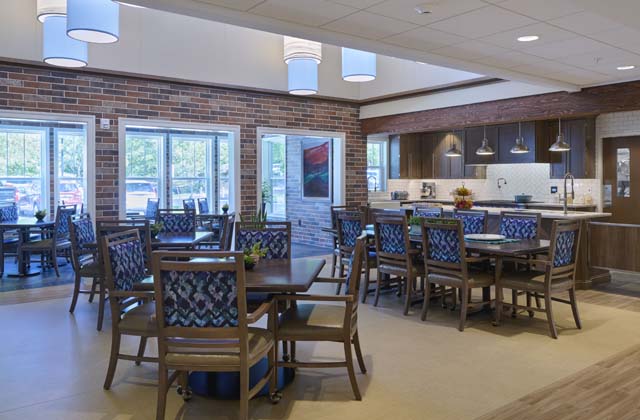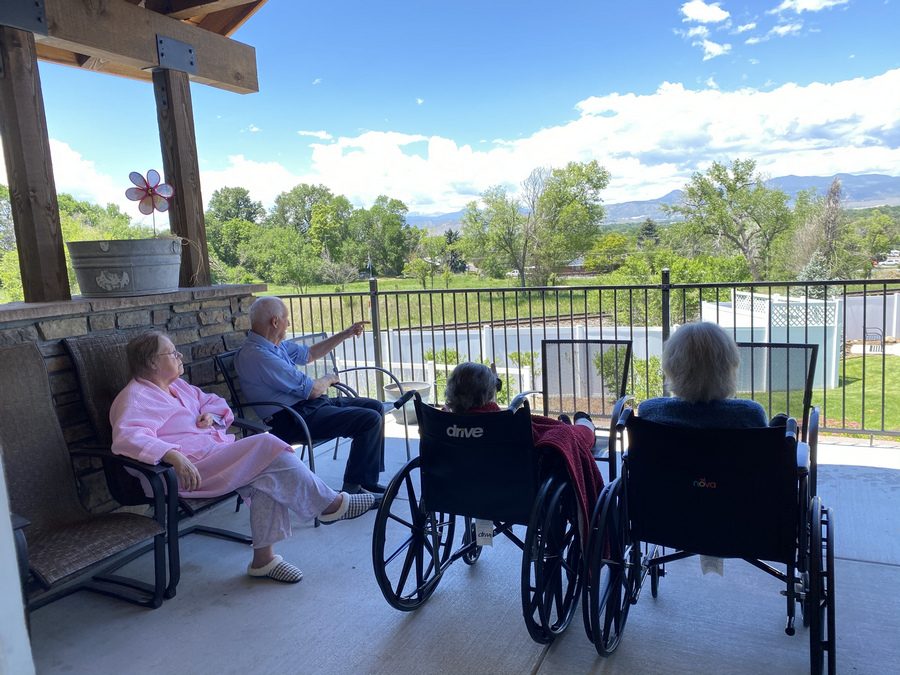Everything About Memory Care Providers: Why Little Memory Treatment Homes Are an Excellent Option
Memory treatment solutions play a vital duty in sustaining individuals with Alzheimer's and dementia. Little memory care homes stand apart for their individualized technique and intimate setup. With lower staff-to-resident proportions, these homes promote stronger connections and tailored care. Homeowners profit from enhanced social interactions and a secure setting. As families check out alternatives, understanding the distinct advantages of tiny memory care homes comes to be important. What elements should be considered when picking the best home?
Understanding Memory Treatment Services
While many may recognize with basic elderly treatment choices, recognizing memory care solutions is crucial for households dealing with the obstacles of cognitive decline. Memory care especially satisfies people with conditions such as Alzheimer's disease and other forms of mental deterioration. These solutions supply an organized setting that focuses on boosting the top quality of life for citizens through specialized care and support.Memory care facilities are developed to assure safety and security and safety and security, often featuring protected settings to avoid wandering. Educated personnel are available around the clock to assist with daily tasks, medicine monitoring, and individual care. Additionally, memory care programs frequently consist of cognitive excitement activities, customized to engage homeowners and advertise mental wellness. Family members can gain from comprehending these solutions, as they make it possible for informed choices concerning their liked ones' treatment, making sure that their specific demands and choices are resolved in a compassionate and supportive fashion.
The Advantages of Tiny Memory Care Residences
Little memory treatment homes supply distinct benefits that can significantly boost the top quality of life for homeowners with cognitive impairments. One substantial benefit is the intimate atmosphere, which enables customized communications amongst team and homeowners. This smaller sized setup promotes meaningful partnerships, minimizing sensations of isolation and stress and anxiety often experienced by people with memory issues.Additionally, the reduced staff-to-resident ratio in tiny memory treatment homes makes it possible for caregivers to supply even more mindful supervision and support. This approach not only improves safety however also promotes a complacency for the residents.Moreover, little memory care homes can adapt swiftly to the distinct needs and choices of each resident, permitting a more homelike ambience. Such a setting can encourage social engagement and participation in activities, ultimately enriching the daily experiences of those coping with cognitive disabilities.
Personalized Treatment Program for Citizens
Customized care strategies are crucial in memory treatment homes, as they provide to the special demands and preferences of each citizen. These plans start with complete evaluations performed by proficient professionals, that evaluate cognitive capacities, clinical background, and individual interests. This customized approach warranties that care is not just reliable however additionally considerate of each person's dignity and autonomy.Moreover, customized treatment strategies are flexible, allowing changes as citizens' demands progress with time. This flexibility fosters a feeling of security and knowledge, which is essential for individuals living with memory obstacles. Caretakers are trained to carry out these strategies consistently, offering support that aligns with the residents' regimens and preferences.Ultimately, personalized care plans boost the quality of life for locals by promoting independence, involvement, and health, making them an essential facet of memory care services in small memory treatment homes.
Developing a Home-Like Setting
Developing a home-like setting is essential for cultivating comfort and familiarity in memory treatment setups, as it significantly influences locals' emotional wellness. Tiny memory treatment homes typically focus on individualized touches, such as warm color combinations, family images, and familiar furniture plans, which aid locals feel more comfortable. Integrating elements reminiscent of a conventional home, like comfy home and communal areas, urges a sense of belonging.Moreover, using all-natural light and outside areas can improve the environment, advertising relaxation and harmony. Employee play a considerable function in keeping this atmosphere by engaging with locals in a compassionate fashion, treating them like family. Routine activities, such as food preparation or gardening, can likewise add to a home-like feel, using possibilities for homeowners to take part in purposeful experiences. Overall, producing a nurturing setting supports cognitive feature and psychological stability, making it a vital aspect of memory treatment services.
Enhanced Social Interaction and Area
Boosted social interaction and community are vital parts of memory treatment services. By promoting customized social involvement and producing a family-like ambience, these solutions advertise purposeful links among residents. Group occasions and activities even more motivate involvement, aiding individuals really feel a lot more included and supported.
Customized Social Engagement
While social interaction is essential for general health, numerous people with memory impairments commonly struggle to involve meaningfully with others. Individualized social engagement in memory treatment homes addresses this difficulty by developing tailored tasks that accommodate homeowners' special passions and capabilities. By concentrating on specific choices, caretakers can promote connections that reverberate deeply with each individual. Activities such as art therapy, songs sessions, and directed conversations promote cognitive stimulation and emotional expression. Furthermore, tiny group setups motivate camaraderie and permit more intimate communications, improving sensations of belonging. This strategy not only combats sensations of seclusion however also encourages citizens to keep a sense of identification, inevitably contributing to boosted psychological health and wellness and top quality of life.
Family-like Ambience
In a memory treatment setting, cultivating a family-like ambience significantly enhances social communication and builds a feeling of community among homeowners. Smaller memory treatment homes usually focus on intimate atmospheres, allowing citizens to create closer links with each other and staff participants. This nurturing ambience advertises depend on, which is crucial for individuals with memory disabilities. Residents are most likely to talk and share experiences, producing an encouraging network that reduces feelings of loneliness. The knowledge of shared areas and regimens adds to a feeling of belonging, additionally urging social interaction (personalized memory care). In such setups, emotional bonds flourish, bring about improved total wellness and a greater quality of life for citizens as they navigate their day-to-day experiences with each other
Team Activities and Occasions

Safety And Security and Safety And Security Functions in Small Houses
Lots of small homes developed for memory care integrate important security and safety features to guarantee the well-being of citizens. These homes typically make use of safe entry and departure indicate prevent wandering, an usual issue among individuals with memory impairments. In addition, monitoring systems and alarm devices improve surveillance, guaranteeing that personnel can without delay react to any kind of unusual activities.Interior designs are tailored for safety, with decreased dangers such as sharp corners and clutter-free paths. Handrails and non-slip flooring are generally set up to decrease the danger of drops. Personnel are learnt emergency protocols, guaranteeing they are planned for numerous situations.Moreover, personalized treatment strategies may consist of assessment of specific security needs, offering tailored options for each and every citizen. Generally, these security and safety features develop a nurturing setting where residents can prosper while maintaining their dignity and freedom.
Just how to Choose the Right Memory Care Home
Exactly how can families assure they choose one of the most suitable memory care home for their loved ones? The decision calls for careful consideration of numerous variables. Households must evaluate the center's personnel qualifications and training, ensuring that caregivers are experienced in handling memory-related problems. Next off, it's vital to evaluate the home's atmosphere, concentrating on security functions and whether it promotes a feeling of area and belonging. Checking out the center can offer understanding into daily activities and the social ambience, which are vital for psychological excitement and psychological wellness. Additionally, families ought to make more inquiries about the treatment strategies offered, guaranteeing they are tailored to specific demands. Finally, considering the home's location and access for family members sees can add to a smoother change. By addressing these aspects, households can make an enlightened choice that prioritizes their loved one's comfort and quality of life in a memory treatment setup.
Regularly Asked Questions
What Qualifications Should Personnel Members in Memory Care Houses Have?
Employee in memory treatment homes must have relevant certifications, experience in dementia treatment, solid communication abilities, and empathy. Recurring training in behavior administration and restorative treatments enhances their ability to sustain homeowners efficiently.
Just How Do Memory Treatment Services Differ From Typical Assisted Living?
Memory treatment services concentrate especially on people with memory problems, supplying specific assistance and structured settings. In comparison, standard assisted living provides basic help with daily tasks, doing not have the tailored method essential for those with cognitive obstacles.
What Sorts of Tasks Are Used in Memory Care Residences?
Memory care homes typically supply a selection of tasks created to involve residents. Common choices consist of art therapy, songs sessions, cognitive games, physical workouts, horticulture, and gatherings, all focused on boosting well-being and cognitive feature.
Can Homeowners Bring Their Own Possessions to Memory Treatment Residences?
Homeowners can normally bring their very own personal belongings to memory care homes, allowing them to customize their living room - personalized memory care. This technique helps create an acquainted atmosphere, promoting convenience and a sense of identity for the people

How Are Member Of The Family Involved in the Treatment Process?
Relative play a vital role in the treatment process, commonly taking part in decision-making, attending care conferences, and giving psychological support. Their involvement promotes a collaborative environment, boosting the resident's general health and high quality of life. While numerous might be familiar with general senior treatment choices, recognizing memory treatment services is necessary for households facing the obstacles of cognitive decrease. These solutions give a structured environment that focuses on improving the top quality of life for citizens via specialized care and support.Memory care read the article facilities are developed to assure security and safety and security, commonly featuring safeguarded environments to stop straying. Individualized care plans are important in memory treatment homes, as they cater to the distinct demands and preferences of each citizen. Team members in memory care homes must have pertinent qualifications, experience in dementia treatment, strong interaction skills, and compassion. Memory care services concentrate especially on individuals with memory disabilities, offering customized assistance and structured settings.